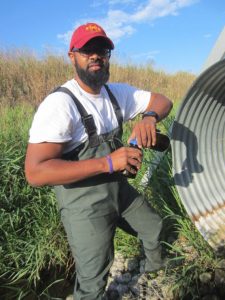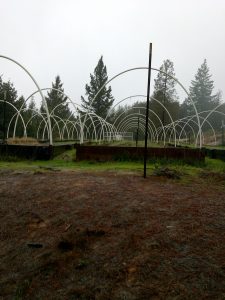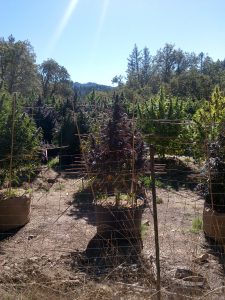
Iowa State young alum shares his experience working for the California North Coast Regional Water Quality Control Board in the wake of changing marijuana regulations and legislation
Maurice Washington spends his days analyzing the environmental impact of legal marijuana cultivation in the largest cannabis-producing region in the U.S.
Washington (’17 PhD agricultural and biosystems engineering) is a water resource control engineer for California’s Southern Cannabis Regulatory Unit, a part of the California Environmental Protection Agency. He analyzes the environmental impact of legal and illegal marijuana cultivation in an area of the state that includes the Emerald Triangle. The Emerald Triangle has the distinction of being the largest cannabis-producing region in the U.S. and is made up of three counties: Humboldt, Trinity and Mendocino.
“My job is to make sure that permit applicants, the people who are growing or cultivating cannabis, whether it’s indoor or outdoor, aren’t impairing or impacting water resources,” Washington explains.
Washington reviews permit proposals for cannabis operations and conducts compliance and enforcement field inspections. If an operation is not up to code, the operator can face arrest, environmental citations, or the eradication of plants by local and state authorities.
“This job is customer service,” Washington says. “We have a lot of applicants who call in who have questions about their application, whether it’s completed or they need some type of technical assistance.”

California was the first state in the nation to legalize cannabis for medical use in 1996. Washington says the North Coast Regional Water Quality Control Board oversees 3,410 of 5,500 statewide enrollees in an area ranging from south of Sonoma County up to the Oregon border. Wineries, fisheries, wildlife and environmental wonders like redwood forests are scattered throughout the region … all of which could be impacted by the newest cash crop.
“California is one of the many states that has legalized use and cultivation of cannabis, but a lot of people don’t think about the environmental impacts of cannabis,” Washington says.
When grown and cultivated without regard to environmental regulations, Washington says marijuana operations can have similar negative impacts as other poorly planned agricultural pursuits. Potential loss of habitat, harmful waste discharge and creation of sediment runoff negatively affect water quality in a state famous for water shortages.[1] He further explains that cannabis plants need a lot of water from March through November, a period that coincides with California’s drier months.
So, when it comes to production, are there any differences between cannabis and conventional crops?
“A lot of people don’t think cannabis is agriculture, but it really is …” Washington says. “Compared to corn and soybean systems that we’d see in Iowa, there aren’t really any differences when it comes to environmental impacts.”

Just like Iowa farmers, cannabis cultivators work with multiple organizations. Washington lists off a couple, including county governments, the California Department of Fish and Wildlife and state water boards. The similarities and differences are important to consider as Iowa grapples with the role of industrial hemp and cannabis in its long-term agricultural economic plan.
“I’m not sure if the infrastructure or the resources are in place to even deal with the number of applicants or applications that there might be [in Iowa],” Washington says. “But on an environmental level, compared to all the water pollution that’s coming from traditional ag in Iowa, I think maybe the potential discharge coming from cannabis cultivation would be a drop in a bucket.”
Another part of the puzzle that is missing from this debate? Detailed research.
“No one has really put the research dollars behind it, because it has been illegal for so long,” Washington says. “So, there are a lot of knowledge gaps.”
For now, this Iowa State graduate will be kept busy enforcing the environmental priorities of a state deeply involved in the national discussion surrounding this debated agricultural commodity.
Footnotes
[1] Dimick, Dennis. (2015, April 6). 5 Things You Should Know About California’s Water Crisis. Retrieved from https://news.nationalgeographic.com/2015/04/150406-california-drought-snowpack-map-water-science/.
Maurice Washington
Cannabis is agriculture whether some people think it is or not, it really is if we go down to the basics.
Announcer
Welcome to Factor Analysis, an in depth conversation of engineering knowledge from the classroom to the field, and topical issues surrounding work and live from an engineer’s viewpoint.
Kate Tindall
I’m Kate Tindall, host of today’s episode of Factor Analysis, I’ll be talking to Maurice Washington, a recent agricultural and biosystems engineering graduate who’s now a water resource control engineer in the Southern Cannabis Regulatory Unit of the state of California, which is part of the Environmental Protection Agency. He spends his days analyzing the environmental impact of legal marijuana cultivation in the largest cannabis producing region in the US.
Maurice Washington
My job is to make sure that the people who are growing or cultivating cannabis, that they aren’t impairing or impacting water resources. As you know, California is one of the many states that has legalized the use and cultivation of cannabis. But a lot of people don’t think about the environmental impacts of cannabis. Being up here in the north coast, there is an area known as the Emerald Triangle. That area is known for producing the vast majority of cannabis in the United States. When we think about the environmental impacts that cannabis can or might have on the North coast, there are a lot of redwood trees, a lot of salmon population and things like that. Those are some of the main environmental impacts that we’re seeing.
Kate Tindall
And it sounds like a lot of the ways this is impacting the environment could also be the basic problems that crop up when you have agriculture of any kind, somewhere. Are there any things that are specifically related to cannabis cultivation that maybe we don’t see in other agricultural pursuits?
Maurice Washington
It’s very similar. It’s just that cannabis is a cash crop and it’s kind of taboo to a lot of people, but I can’t really think about any differences in the environmental impacts. I will say this, the prime growing time for cannabis occurs when we have limited water. So there are instances where there are loss of in-stream flows that might impact you know, salmon population or impact other industries that are using that water as well.
Kate Tindall
I’m really curious to hear a day in your job or typical week in your job if there is such a thing as a typical day or typical week. Do you visit the cannabis operations? How does your job look on a day to day basis?
Maurice Washington
Believe it or not it’s a lot of customer service, this job is customer service. We have a lot of applicants who call in who have questions about their application or they need some type of technical assistance. You have to be a people person because you have to realize this is a lot of people’s livelihoods up here. It’s a lot of working with other state organizations. Let’s say we have someone who is not registered or have coverage on our order. So technically they are not in good standing with the state and they are cultivating illegally. So when we have those enforcement inspections, we go in with other partner agencies, whether it’s California Department of Fish and Wildlife, with a game warden. Or with the local county sheriff. And from our aspect, we inspect and we look for environmental crimes or environmental issues. It can be anything from improper storage of chemicals. We notice runoff occurring. Our job is to look at the environmental issues that we see on those inspections.
Kate Tindall
Maurice is a graduate of Iowa State’s Department of Agricultural and Biosystems Engineering. He just completed his doctoral degree in 2017. So the experience of being an ag engineer in Iowa is still pretty fresh. Right now, Iowa politicians and citizens are weighing the possible pros and cons for legalizing the cultivation of industrial hemp. In your opinion, if Iowa were to legalize cannabis, what impact could it have on the state’s water supplies, seeing as that industry has not yet come into Iowa?
Maurice Washington
I mean, when you think about Iowa water quality, you know, I just go straight to the amount of nitrate that is in the water from tile drain systems and corn and soybean systems and I think if cannabis were to be legalized, in Iowa, most of it will be indoor because it is so cold. So if it was indoor most of the waste would be probably going to sewer systems. So on an environmental level, compared to all the water pollution that’s coming from traditional ag in Iowa, I think potential dischargees coming from cannabis cultivation would be a drop in a bucket. It wouldn’t rise to the level of traditional agriculture. It just wouldn’t.
Kate Tindall
The debate over cannabis legalization, whether cannabis can be grown, where it can be grown, how it can be grown. All of these questions and more are hot point in our country’s shared dialogue. Since he’s so called close to this issue on a daily basis. I wanted to ask Maurice what he thought.
Maurice Washington
I have no opinion on policy or anything like that.
Kate Tindall
Yep, he shut that question down.
Maurice Washington
My biggest thing is water quality. I just I’m big on water quality, making sure that you know, the water is clean and you know, can be used for generations to come.
Kate Tindall
So no political opinion. Maurice brings up several times that cannabis is agriculture, no matter which side of the debate you fall on. And like many new commodities in the past, figuring out cannabis’s place in American society may take some time.
Maurice Washington
So I think California has a great system setup and it can be an example to other states for sure. And again, it’s not a perfect there’s going to be you know, bumps and bruises in the road. You gotta realize that cannabis cultivation was illegal for a very long time in the state of California. So it’s going to take time for everything to run smoothly. But I think it’s a great start.
Kate Tindall
During our discussion with Maurice, my producer, who lived in Marin County for 10 years, wanted to know if legalizing marijuana had opened up ways to enforce environmental regulations. So one of my final questions to Maurice was since legalizing marijuana has become at all easier to protect waterways and natural resources,
Maurice Washington
I think this gives us an avenue to really assess those environmental issues. Because you have to realize that, you know, cannabis for the most part is the new kid on the block. There are other industries that are using the same water sources. You know, you have the vineyards and you have different industrial entities and different cities. So, say it’s been quite interesting, but I think it has led to us being able to see more environmental issues, but there’s always been enforcement when it comes to cannabis.
Kate Tindall
And how different is cannabis really from conventional cash crops when it comes to environmental effects.
Maurice Washington
I think this is really the infancy in regards to looking at environmental issues in regards to cannabis cultivation. The research aspect of it is slowly, slowly starting to come to the forefront and once we have more research, we’ll know a lot more. cannabis is agriculture, whether some people think it is or not, it really is if you go down to the basics.
Kate Tindall
Thanks for speaking with us, Maurice. I’m Kate Tindall and I’ll talk to you again soon on Factor Analysis.
Announcer
Factor Analysis is produced by Iowa State University’s College of Engineering. For a list of ways to keep up with the college including more podcasts, social media and apps go to engineering.iastate.edu. Music by Lee Rosevere and used under creative commons license.
